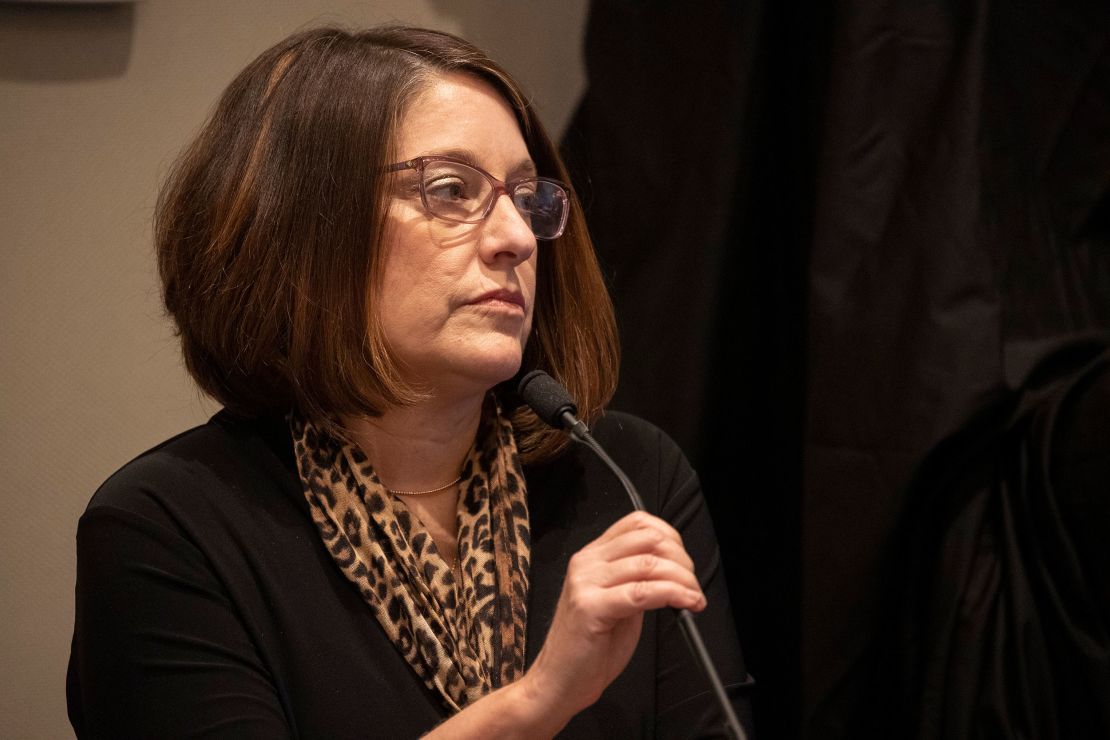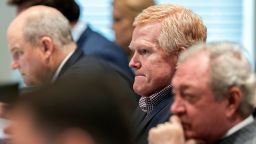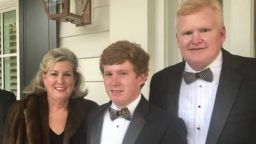The chief financial officer of Alex Murdaugh’s former law firm testified in his double murder trial Thursday about confronting the now-disbarred attorney about missing funds the morning his wife and son were killed, as prosecutors work to convince the judge to allow testimony about Murdaugh’s alleged financial crimes.
The testimony of Jeanne Seckinger, CFO of the firm formerly known as PMPED, was heard Thursday morning without the jury present as Judge Clifton Newman weighs whether to allow the admission of evidence about Murdaugh’s purported schemes, for which he faces 99 charges separate from the murder case.
Prosecutors indicated in pretrial filings they believed Murdaugh killed his wife, Margaret “Maggie” Murdaugh and his 22-year-old son Paul Murdaugh to distract attention from those alleged crimes, which the state contends were about to come to light when they were killed on June 7, 2021.
That morning, Seckinger confronted Murdaugh about $792,000 in missing funds, she said Thursday, testifying that legal fees should have been made payable to the law firm – renamed to Parker Law Group after Murdaugh’s ouster – and not to individual attorneys.
But Seckinger and other members of the firm realized in May 2021 they had not received a fee check stemming from a settlement signed in a case Murdaugh shared with another attorney, Chris Wilson, Seckinger testified, which was a concern.
“Either he’s got a check he hasn’t turned into us that is properly payable to PMPED or he’s received a check payable to him,” Seckinger said.
Seckinger testified she confronted Murdaugh on June 7 and told him she had reason to believe he had received the funds himself and that he needed to prove to her he had not.
“He assured me that the money was there, and that he could get it,” Seckinger said.
At the time, Murdaugh was facing a lawsuit from the family of 19-year-old Mallory Beach, who was killed in February 2019 when a boat, owned by Murdaugh and allegedly driven by Paul, struck a bridge piling.
Murdaugh’s financial records – which state court filings said “would expose (Murdaugh) for his years of alleged misdeeds” – could have been disclosed following a hearing in the civil case scheduled for June 10, 2021, three days after the killings.
Prosecutors’ pretrial motion contended “the murders served as Murdaugh’s means to shift the focus away from himself and buy some additional time to try and prevent his financial crimes from being uncovered, which, if revealed, would have resulted in personal legal and financial ruin for Murdaugh.”According to that filing, the missing $792,000 had already been spent.
But the June 10 hearing was canceled after Maggie and Paul’s deaths, Seckinger said Thursday, and the firm opted not to confront Murdaugh about the missing money.
“Alex was distraught and upset and not in the office much” after the killings, Seckinger said. “And nobody wanted to harass him about nothing that we thought was really missing, when we had several months till the end of the year to clear it up. So we were not going to harass him at that point in time.”

Prosecutor: Alleged financial crimes ‘certainly relevant’ to murder case
According to the South Carolina Attorney General’s Office, Murdaugh, who was disbarred amid a mountain of allegations of white-collar theft and fraud, faces 99 charges stemming from 19 grand jury indictments, including allegedly defrauding his clients and former law firm of nearly $9 million.
Under each case, Murdaugh faces the possibility of two sentences of life in prison without the possibility of parole if convicted.
The defense has fought the admissibility of the evidence in the murder case, claiming the fraud cases are irrelevant to the question of Murdaugh’s guilt in the murders of his wife and son. Defense attorney Jim Griffin argued Thursday that admitting the evidence could add weeks to the murder trial.
But Creighton Waters of the South Carolina Attorney General’s Office – which is prosecuting the case due to the Murdaugh family’s decades-old ties with the local solicitor’s office – indicated to the judge the state hoped to focus on “just a few areas” most closely connected to the case.
“There are two things very temporally connected with this particular crime. That is the confrontation with Ms. Seckinger that morning over the (missing) fees that had been percolating for a while,” Waters said. “And number two, is that pending hearing that very week in the boat case.”
“The defense asked the question, can you think of any reason?” Waters said, referring to the defense’s cross-examination of a friend of Paul’s Wednesday who was asked if he could think of any reason why Murdaugh might commit the murders. The friend said he could not.
“And all of this going on in his life, which is a stellar series of events like nothing ever seen,” Waters said. “It is certainly relevant for the jury to consider when they consider the perfect storm that was arriving for this man on June the 7th.”
The prosecution’s case heard in camera Thursday illustrated Murdaugh’s alleged transgressions went far beyond the missing $792,000 Seckinger confronted Murdaugh about the morning prior to the murders.
Waters separately took the law firm CFO through a long list of instances in which he allegedly misappropriated funds stemming from the settlements in cases he handled. Seckinger verified documents from case after case on the stand Thursday, testifying Murdaugh “stole” what amounted to millions of dollars from clients and the law firm. The firm, she said, was responsible for paying back what Murdaugh had stolen.
Eventually, the firm’s partners did confront Murdaugh about the missing money.
“And it was my understanding that Alex admitted it and that it was determined he would resign,” Seckinger said, adding the firm decided not to announce his resignation until the beginning of the following week.
Before that could happen, however, Seckinger testified she heard Murdaugh had been shot while on the side of the road. Murdaugh later told authorities he conspired with a former client to kill him as part of an insurance fraud scheme, purportedly so his surviving son could collect a $10 million life insurance payout.
“Nobody knew what to think,” Seckinger said, but the firm immediately searched its books and commissioned a forensic audit from an outside firm.
CNN’s Randi Kaye contributed to this report.








